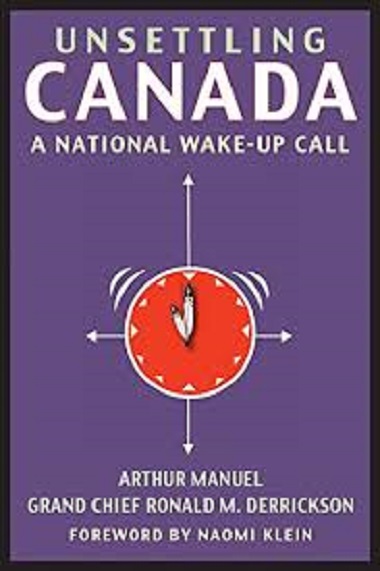To read the full PDF version, click here (TBD)
To listen to the full audio version, click here (TBD)
To purchase and/or read additional reviews, see Amazon page here
What do I love about: Unsettling Canada?
As a new immigrant, the struggles of native Canadians and the Crown is one I have never really understood. I reside in Ottawa – the capital city and I observe how the Natives are incorporated into events where the issue of reconciliation is often mentioned. Arthur Manuel has done a fantastic job in providing history that dates back to the 19th century on the struggles of the Natives. Whether it is the Cree, Metis, Inuits, or Arthur’s Secwepemc peoples, the ask to be independent is deeply rooted in the many deceits and covetousness of the crown. Native Canadians continue to suffer despite the availability of resource rich lands. From the white paper, to Section 35 and Delgamuukw it would seem like for every progress Native Canadians made they go 2 centuries backward. The internal strife between the Native tribes also threatened the singular goal of attaining recognition and autonimity. Arthur Manuel wraps this book up by providing practical recommendations that ensure the guidelines as demonstrated in all preceding legal pronouncements are brought to reality. He denounces the doctrine of discovery and extinguishment and calls for continues efforts by all Canadians, indigenous and non-indigenous in the fight for indigenous rights.
What do I not love about: Unsettling Canada?
Zilch
Who should read: Unsettling Canada?
I recommend this book for every Canadian. Because like the Blacks, this book provides context into the current issues the indigenous people have with the government.
Who should not read: Unsettling Canada?
This people may be dry or unrelatable for non-Canadian residents/citizens.
Notes from Unsettling Canada
Chapter 2: Institutionalizing a People
- Reducio ad absurdum- the carrying of something to an absurd extreme
- I understood from my father that simply lashing out against injustice is rarely productive. You have to think things through; you have to work with people first and develop clear objectives and then be ready to act. You are responsible for those you lead
- There were in fact, important similarities in the situations of American blacks and of Indians in Canada. Both peoples had been subjected to prolonged institutional and informal discrimination that had left them in abject poverty on the fringes of the society. But there was an important distinction as well. Indigenous peoples had not been stolen into slavery and brought to a foreign land, but had their land stolen from underneath them.
Chapter 7: Don’t let them bully you
- ‘Don’t let them bully you’. It is a message that indigenous business people should have inscribed on the wall where they can see it when they open their eyes in the morning
Chapter 13: The fourth world
- The Indian and Aboriginal were both discussed; in the end, an old and respected indigenous leader from Colombia who had just listened to the debate for days got up and said, “Indian and Aboriginal were colonial terms. We are people Indigenous to our territory, so indigenous is the term that should be used
- Doctrine of Discovery- The basis British and other European powers used to claim our lands and sovereignty over them.
Chapter 15: No half measures
- The way the negotiations worked is that the provincial and federal government loan the band money to pay the cost of negotiations. The money is used for lawyers and consultant, most of them non-indigenous, and their hotels, per diems, and travel budgets. Repayments of those loans are to be made from the settlement money paid to First Nations as part of the final treaty or, if the band pulls of negotiation, from the band’s general revenues. Overall, the negotiating bands in BC today are in hock for well over half a billion dollars in negotiating loans, an amount that increases day by day.
Chapter 16: Days of Protest
- Before you have community participation, you must have community education
- Our biggest strength is in the economic uncertainty that our legal, constitutional, and political actions create for the status quo
Chapter 17: The end of Colonialism
- We cannot have reconciliation until the extinguishment policy is off the table and our aboriginal title and treaty rights are recognized, affirmed and implemented by Canada and the provinces. Not only in the constitution but also on the ground. We need to negotiate the dismantling of the colonial system, not bargain for cash deals that extinguish our rights and produce nothing except more debts and dependency. We need to stand up and fight colonialism in all its manifestations. We need to root out the racism and impoverishment that colonialism systematically creates for the vast majority of our peoples
- In any negotiations, there are things that you do not put on the table. For indigenous nations, this includes surrendering our land. Instead, what indigenous peoples in Canada can discuss is what kind of usage of our land can we live with and under what conditions.
